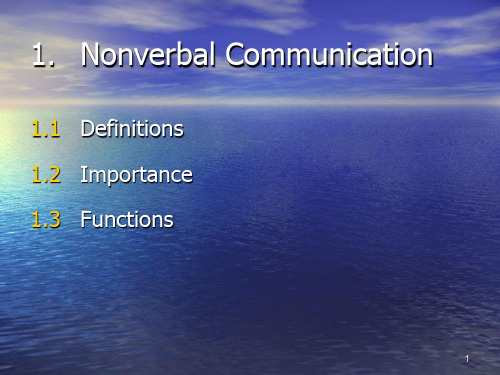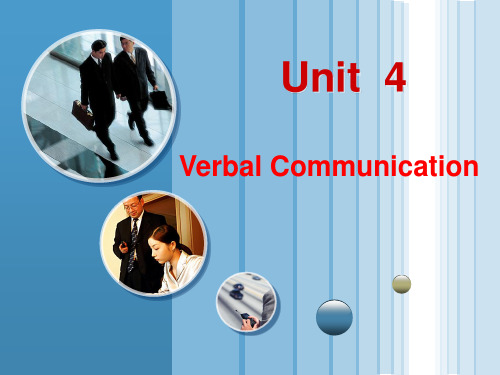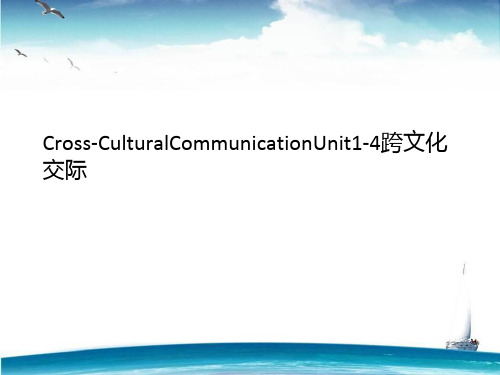跨文化交际课件Unit 4 II
合集下载
跨文化交际 全套课件

• 3.in the west ,if you were invited to have a meal at someone’s home, there will often be only one or two dishes.Even it was a formal dinner, it would usually be just three courses:soup, main dish, and desert. But in China,an informal dinner would have four dishes and a soup; a a formal dinner would have at least eight dishes and a soup.
• 1.There are at least two or more people.
• 2.There must be some contact between communicators.
• 3.There must be a language shared by communicators.
• 4.an exchange of information has taken place.
communication
• Activity 2 meanings in communication
• Utterance meaning :what it normally means
• Speakers meaning:the speaker has intended to convey by way of utterance meaning .
• 5.Many people feel religious belief are very personal and they may not feel; comfortable to tell someone they hardly know.
跨文化交际PPT演示课件

23
3. Space and Distance
3.1 Proxemics 3.2 Attitudes Toward Crowding
24
3.1 Proxemics
✓ Definition: the study of people’s perception and use of space.
✓ Four categories: intimate, personal, social, and public distance.
26
Categories of Distance (cont’d)
• Social Distance (1.3-3m) - colleagues, business partners, people at social gatherings
• Public Distance (beyond 3m) - speaking in public
- direct intrusion into others’ affairs • Shrugging shoulders
- indifferent, powerless, having no secret to conceal
19
Postures (cont’d)
• Follow one’s natural habits so often go unnoticed (subconscious in nature)
• May damage your image if you neglect your postures
20
2.4 Eye Contact
Direct eye contact • Chinese: avoid • North Americans: appreciate • The British: avoid
3. Space and Distance
3.1 Proxemics 3.2 Attitudes Toward Crowding
24
3.1 Proxemics
✓ Definition: the study of people’s perception and use of space.
✓ Four categories: intimate, personal, social, and public distance.
26
Categories of Distance (cont’d)
• Social Distance (1.3-3m) - colleagues, business partners, people at social gatherings
• Public Distance (beyond 3m) - speaking in public
- direct intrusion into others’ affairs • Shrugging shoulders
- indifferent, powerless, having no secret to conceal
19
Postures (cont’d)
• Follow one’s natural habits so often go unnoticed (subconscious in nature)
• May damage your image if you neglect your postures
20
2.4 Eye Contact
Direct eye contact • Chinese: avoid • North Americans: appreciate • The British: avoid
跨文化交际实用教程unit4ppt课件

• 4) The new office block has unfortunately become an expensive white elephant
最新版整理ppt
16
• 5 Mary was always regarded as the black sheep of the family
11
最新版整理ppt
Culturally Loaded Words 文化负载词
(Cultural Loaning Words) • 1.是指标志某种文化中特有事物的词
组和短语.
• 2.文化负载词是反映一个国家、一个 民族特有的文化和历史的一些词汇.
最新版整理ppt
12
2.2 Color Terms in Chinese and English
Unit 4
Verbal Communication
Objectives
Learn the culturally loaded words Learn the cultural reflections on
proverbs Learn taboos Learn the differences in cultural
• 6 You’d better do something to prove you’re not
• 7 Can you see the green in her eyes?
• 8 The mere thought of her husband with the secretary made her see yellow
patterns
III. Summary IV. Assignments
3
最新版整理ppt
最新版整理ppt
16
• 5 Mary was always regarded as the black sheep of the family
11
最新版整理ppt
Culturally Loaded Words 文化负载词
(Cultural Loaning Words) • 1.是指标志某种文化中特有事物的词
组和短语.
• 2.文化负载词是反映一个国家、一个 民族特有的文化和历史的一些词汇.
最新版整理ppt
12
2.2 Color Terms in Chinese and English
Unit 4
Verbal Communication
Objectives
Learn the culturally loaded words Learn the cultural reflections on
proverbs Learn taboos Learn the differences in cultural
• 6 You’d better do something to prove you’re not
• 7 Can you see the green in her eyes?
• 8 The mere thought of her husband with the secretary made her see yellow
patterns
III. Summary IV. Assignments
3
最新版整理ppt
Cross-Cultural Communication Unit 1-4 跨文化交际(课堂PPT)

15
CHAPTER 1 - Communication and Culture: The Challenge of The Future
Dominant Culture
Co-Cultures
• It's the one in power -
• They are numerous.
control.
• Distinct and unique
• Meanwhile, aging population in more developed countries – Could bring more communication issues between older generations and younger generations (this can be treated as co-culture).
ethnic background, age, sex,
media, monetary systems,
or other factors.
etc.
16
17
• We learn our culture through proverbs
– Offer an important set of instructions
Our goal in this class is to answer some of the following questions: • Why do we often uncomfortable when encountering people who are different from yourself? • Why do people from different cultures behave in ways that seem strange to you? • How do cultural differences influence communication? • Which cultural differences are important and which are inconsequential? • Why is it difficult to understand and appreciate cultural difference?
跨文化交际(全套课件255P)

• 与美国人在一起,就照美国人的方式、习俗去说话、办事;与中国人在一起, 就按中国人的习俗来做。
2021/6/6
第二语言教学的主要目标是培养学生的跨文化交际能力。
• 跨文化交际能力指的是跨文化交际环境中的交际能力,即来自不同文化背景的 人之间进行交际时,具有强烈的跨文化意识,善于识别文化差异和排除文化干 扰并成功地进行交际的能力。是在跨文化交际环境中由语言交际能力、非语言 交际能力、语言规则和交际规则转化能力以及文化适应能力所组成的综合能力。
2. 文化不是先天所有,而是通过后天习得的。
文化共性:即人类的共性。人类文化共性是主要和基本的。文化 共性构成各种文化之间交际和共存的基础。
文化个性:长期的历史积淀形成了不同的文化个性。文化差异造 成了跨文化交际的障碍。
2021/6/6
文化的特性
1. 文化是人类所独有的,是区别人类和动物的主要标志。文化是社会遗产,而 不是生理的遗传。
2021/6/6
第二语言教学中需要处理好三种关系
1. 课堂教学与课外交际之间的关系,包括课本语言教学与课外应用指导之间的 关系。
2. 第二语言教学与第二文化教学之间的关系。 3. 培养学生的语言交际能力和培养他们的跨文化交际能力之间的关系。
你喜欢我们的日程安排吗?How do you like our schedule?
2021/6/6
文化的特性
• 文化是人类所独有的,是区别人类和动物的主要标志。文化是社会遗产,而不 是生理的遗传。
春雨惊春清谷天,夏满芒夏暑相连, 秋处露秋寒霜降,冬雪雪冬小大寒。
2021/6/6
文化的特性
1. 文化是人类所独有的,是区别人类和动物的主要标志。文化是社会遗产,而 不是生理的遗传。
2021/6/6
第二语言教学的主要目标是培养学生的跨文化交际能力。
• 跨文化交际能力指的是跨文化交际环境中的交际能力,即来自不同文化背景的 人之间进行交际时,具有强烈的跨文化意识,善于识别文化差异和排除文化干 扰并成功地进行交际的能力。是在跨文化交际环境中由语言交际能力、非语言 交际能力、语言规则和交际规则转化能力以及文化适应能力所组成的综合能力。
2. 文化不是先天所有,而是通过后天习得的。
文化共性:即人类的共性。人类文化共性是主要和基本的。文化 共性构成各种文化之间交际和共存的基础。
文化个性:长期的历史积淀形成了不同的文化个性。文化差异造 成了跨文化交际的障碍。
2021/6/6
文化的特性
1. 文化是人类所独有的,是区别人类和动物的主要标志。文化是社会遗产,而 不是生理的遗传。
2021/6/6
第二语言教学中需要处理好三种关系
1. 课堂教学与课外交际之间的关系,包括课本语言教学与课外应用指导之间的 关系。
2. 第二语言教学与第二文化教学之间的关系。 3. 培养学生的语言交际能力和培养他们的跨文化交际能力之间的关系。
你喜欢我们的日程安排吗?How do you like our schedule?
2021/6/6
文化的特性
• 文化是人类所独有的,是区别人类和动物的主要标志。文化是社会遗产,而不 是生理的遗传。
春雨惊春清谷天,夏满芒夏暑相连, 秋处露秋寒霜降,冬雪雪冬小大寒。
2021/6/6
文化的特性
1. 文化是人类所独有的,是区别人类和动物的主要标志。文化是社会遗产,而 不是生理的遗传。
跨文化交际实用教程unit4专题培训课件

Objectives
Learn the culturally loaded words Learn the cultural reflections on
proverbs Learn taboos Learn the differences in cultural
thought patterns
III. Summary IV. Assignments
2
I. Warm-up cases
Case 1. Shoes for Street Walking Question : Why did the Italian shop owner
make such a blunder? Shoes for street walking. Come in and have a fit.
Comment:
Hustle---- to force sb to make a decision before they are ready or sure
-----to work as a prostitute / romance or sex is hinted
5
Case 3 Look out
8
Interpretations 龙--- in CC, it is a totem with many
royal associations, 龙颜,龙床, 龙袍, 龙心大喜。
In EC, dragon refers to horrible, disgusting monsters.
9
知识分子
In CC, it refers to people including college teachers, college students, middle school teachers, and such people as medical doctors, engineers, interpreters.
Learn the culturally loaded words Learn the cultural reflections on
proverbs Learn taboos Learn the differences in cultural
thought patterns
III. Summary IV. Assignments
2
I. Warm-up cases
Case 1. Shoes for Street Walking Question : Why did the Italian shop owner
make such a blunder? Shoes for street walking. Come in and have a fit.
Comment:
Hustle---- to force sb to make a decision before they are ready or sure
-----to work as a prostitute / romance or sex is hinted
5
Case 3 Look out
8
Interpretations 龙--- in CC, it is a totem with many
royal associations, 龙颜,龙床, 龙袍, 龙心大喜。
In EC, dragon refers to horrible, disgusting monsters.
9
知识分子
In CC, it refers to people including college teachers, college students, middle school teachers, and such people as medical doctors, engineers, interpreters.
Cross-CulturalCommunicationUnit1-4跨文化交际.ppt

• In order to study cross-cultural communication, we must pay attention to the following:
a) Each individual are unique. b) Stereotyping. c) Objectivity. d) Communication is not a Cure-all.
CHAPTER 1 - Communication and Culture: The Challenge of The Future
• Culture is – Transmitted from generation to generation – Learned – Shared – Based on symbols – Dynamic – An intergrated system
Cross-CulturalCommunicationUnit1-4跨文化 交际
CHAPTER 1
Communication and Culture: The Challenge of The Future
CHAPTER 1 - Communication and Culture: The Challenge of The Future
– increased the probability of survival
– satisfaction for the participants in an ecological niche
– share with those who could communicate with each other and lived in the same tCommunication:
a) Each individual are unique. b) Stereotyping. c) Objectivity. d) Communication is not a Cure-all.
CHAPTER 1 - Communication and Culture: The Challenge of The Future
• Culture is – Transmitted from generation to generation – Learned – Shared – Based on symbols – Dynamic – An intergrated system
Cross-CulturalCommunicationUnit1-4跨文化 交际
CHAPTER 1
Communication and Culture: The Challenge of The Future
CHAPTER 1 - Communication and Culture: The Challenge of The Future
– increased the probability of survival
– satisfaction for the participants in an ecological niche
– share with those who could communicate with each other and lived in the same tCommunication:
跨文化交际课件Unit 4 II

• 4)– Waiter! • --Yes, sir • 5)—Yes? • --I’d like two tickets, please • 6)– Everything will be all right soon, yes? • 2 Different ways to say Yes
How to refuse others?
• 5)Avoidance • 6) General acceptance of an offer but giving no details • 7) Diverting and distracting • 2 Japanese way to say No
Discovering Problems: Translating across Languages
• 1) Being silent or showing a lack of enthusiasm • 2)Offering an alternative • 3)Postponement(delaying answers) • 4) Putting the responsibility on a third party or something over which you have no control
Questions I
1. Do you think the original is a lively presentation? Is it well written? Why or why not? 2. Is the translation faithful to the original? Is it appropriate for foreign readers?
Unit Four
Language and Culture
- 1、下载文档前请自行甄别文档内容的完整性,平台不提供额外的编辑、内容补充、找答案等附加服务。
- 2、"仅部分预览"的文档,不可在线预览部分如存在完整性等问题,可反馈申请退款(可完整预览的文档不适用该条件!)。
- 3、如文档侵犯您的权益,请联系客服反馈,我们会尽快为您处理(人工客服工作时间:9:00-18:30)。
• 1) Being silent or showing a lack of enthusiasm • 2)Offering an alternative • 3)Postponement(delaying answers) • 4) Putting the responsibility on a third party or something over which you have no control
Dragon-Boat Festival
•
The lightsome dragon-boats appear on the river as though the stars twinkle in the milkway. The richly decorated pleasure-boats look like a scene of mirage. The splendid awnings in green and gold chain into a palace of crystal. Is this a fairyland or a mere dream? Looking above, you can see the doves flying about; looking below, you can see the sailing lamps glittering. Crackling are the fireworks, which present you a picture of fiery trees and silver flowers.
• 4)– Waiter! • --Yes, sir • 5)—Yes? • --I’d like two tickets, please • 6)– Everything will be all right soon, yes? • 2 Different ways to say Yes
How to refuse others?
assertions about how terrific it all is, but in unintentionally hilarious language that leaves the reader laughing out uninformed … The brochure also suffers from lack of background material, the taking-itfor-granted that the reader already is familiar with many aspects of Chinese
• 1. Lexical equivalence
• 2. Idiomatic equivalence • 3. Grammatical-syntactical equivalence • 4. Experiential equivalence
• 5. Conceptual equivalence
Lexical Equivalence
1. Color Terms 眼红 青天 怡红公子 blue-eyed boy
green-eyed blue sky Green Boy 眼中红人
Idiomatic Equivalence
1. raining cats and dogs 2. Love me, love my dog. 3. Give a dog a bad name and hang him. 4. 狗嘴里吐不出象牙来 a filthily mouth can not utter decent language
Experiential Equivalence
1.The word “Ocean” to the tribe in a mountainous jungle region
2.Though your sins be as scarlet, they shall be as white as snow.
Conceptual Equivalence
Spanish: Te amo / Te quieto English: owl cricket Chinese: magpie bat
Case 13
我失骄杨君失柳, 杨柳轻飏直上重霄九。
----- 蝶恋花· 答李淑一
Version 1
I lost my proud Poplar and you your Willow, Poplar and Willow soar into the Ninth Heaven.
• 5)Avoidance • 6) General acceptance of an offer but giving no details • 7) Diverting and distracting • 2 Japanese way to say No
Discovering Problems: Translating across Languages
〔骄杨〕指作者的夫人杨开慧。杨开慧(一九○一——一九三○), 湖南长沙人,一九二一年加入中国共产党,在中共湘区委员会负 责机要兼交通联络工作,后随作者去上海、武汉等地。一九二七 年大革命失败后,隐蔽在长沙板仓坚持地下工作。一九三○年十 月被国民党反动派逮捕,十一月牺牲。 〔飏(yá ng扬)〕飘扬。 〔重霄九〕九重霄,天的最高处。我国古代神话认为天有九重。 〔吴刚〕神话中月亮里的一个仙人。据唐段成式《酉阳杂俎》, 月亮里有一棵高五百丈的桂树,吴刚被罚到那里砍树。桂树随砍 随合,所以吴刚永远砍不断。 〔嫦娥〕神话中月亮里的女仙。据 《淮南子· 览冥训》,嫦娥(一作姮娥、恒娥)是羿(yì 异)的妻子,因 为偷吃了羿从西王母那里求到的长生不死药而飞入月中。 〔舒广 袖〕伸展宽大的袖子。 〔忽报人间曾伏虎,泪飞顿作倾盆雨〕忽 然听到中国人民终于推翻了国民党反动派统治的捷报,两位烈士 的忠魂顿然高兴得泪流如雨。 〔舞、虎、雨〕这三个韵脚字跟上 文的“柳、九、有、酒、袖”不同韵。作者自注:“上下两韵, 不可改,只得仍之。”
Version 2
I’ve lost proud Yang and you’ve lost Liu, Their souls fly up into the blue.
Байду номын сангаас
蝶恋花· 答李淑一(1957年5月11日) 我失骄杨君失柳, 杨柳轻飏直上重霄九。 问讯吴刚何所有, 吴刚捧出桂花酒。 寂寞嫦娥舒广袖, 万里长空且为忠魂舞。 忽报人间曾伏虎, 泪飞顿作倾盆雨。 这首词最早发表在一九五八年一月一日湖南师 范学院院刊《湖南师院》。 注释 〔答李淑一〕 这首词是作者写给当时的湖南长沙第十中学语 文教员李淑一的。
Case 14
Translate the following and comment on it.
轻快的龙舟如银河流星,瑰丽的彩船 似海市蜃楼,两岸那金碧辉煌的彩楼连成 灯舞回旋千姿百态,汽船腾起一江春潮, 射击手点破满天彩球,还有雀鸟争鸣,花 卉盆景竞艳,书画、工艺展览铺出琳琅满 目的画廊…… 啊,滨江城是不夜城,龙舟 会是群英会。
Questions
1. Do you know the meanings of 杨柳 here? What do they refer to? How should they be translated in English?
2. What do you think of the two English versions?
Comments on the Translation
• My first reaction was unfortunately laughter because it is so full of mistakes. It omits some necessary information about the Dragon-Boat Festival, including its historical origins and when it actually takes place. These things are important … The copy seems to try to “snow” the reader with fanciful, overblown
词中的“柳”指李淑一的丈夫柳直荀烈士(一 八九八——一九三二),湖南长沙人,作者早 年的战友。一九二四年加入中国共产党,曾任 湖南省政府委员,湖南省农民协会秘书长,参 加过南昌起义。一九三○年到湘鄂西革命根据 地工作,曾任红军第二军团政治部主任、第三 军政治部主任等职。一九三二年九月在湖北洪 湖革命根据地被害。一九五七年二月,李淑一 把她写的纪念柳直荀的一首《菩萨蛮》词寄给 作者,作者写了这首词答她。
Questions I
1. Do you think the original is a lively presentation? Is it well written? Why or why not? 2. Is the translation faithful to the original? Is it appropriate for foreign readers?
history and culture … It doesn’t tell you where to go, how to get there, when things are open and closed, how much they cost, and so forth. All these are things people visiting an area want to know.
How to Say Yes and No
• Translate the following: • 1) Do you like the new school? • --Yes, I do • 2) –Please don’t say that • --Yes, I will • 3)—I know what he wants • -- Yes? • -- Money!
Dragon-Boat Festival
•
The lightsome dragon-boats appear on the river as though the stars twinkle in the milkway. The richly decorated pleasure-boats look like a scene of mirage. The splendid awnings in green and gold chain into a palace of crystal. Is this a fairyland or a mere dream? Looking above, you can see the doves flying about; looking below, you can see the sailing lamps glittering. Crackling are the fireworks, which present you a picture of fiery trees and silver flowers.
• 4)– Waiter! • --Yes, sir • 5)—Yes? • --I’d like two tickets, please • 6)– Everything will be all right soon, yes? • 2 Different ways to say Yes
How to refuse others?
assertions about how terrific it all is, but in unintentionally hilarious language that leaves the reader laughing out uninformed … The brochure also suffers from lack of background material, the taking-itfor-granted that the reader already is familiar with many aspects of Chinese
• 1. Lexical equivalence
• 2. Idiomatic equivalence • 3. Grammatical-syntactical equivalence • 4. Experiential equivalence
• 5. Conceptual equivalence
Lexical Equivalence
1. Color Terms 眼红 青天 怡红公子 blue-eyed boy
green-eyed blue sky Green Boy 眼中红人
Idiomatic Equivalence
1. raining cats and dogs 2. Love me, love my dog. 3. Give a dog a bad name and hang him. 4. 狗嘴里吐不出象牙来 a filthily mouth can not utter decent language
Experiential Equivalence
1.The word “Ocean” to the tribe in a mountainous jungle region
2.Though your sins be as scarlet, they shall be as white as snow.
Conceptual Equivalence
Spanish: Te amo / Te quieto English: owl cricket Chinese: magpie bat
Case 13
我失骄杨君失柳, 杨柳轻飏直上重霄九。
----- 蝶恋花· 答李淑一
Version 1
I lost my proud Poplar and you your Willow, Poplar and Willow soar into the Ninth Heaven.
• 5)Avoidance • 6) General acceptance of an offer but giving no details • 7) Diverting and distracting • 2 Japanese way to say No
Discovering Problems: Translating across Languages
〔骄杨〕指作者的夫人杨开慧。杨开慧(一九○一——一九三○), 湖南长沙人,一九二一年加入中国共产党,在中共湘区委员会负 责机要兼交通联络工作,后随作者去上海、武汉等地。一九二七 年大革命失败后,隐蔽在长沙板仓坚持地下工作。一九三○年十 月被国民党反动派逮捕,十一月牺牲。 〔飏(yá ng扬)〕飘扬。 〔重霄九〕九重霄,天的最高处。我国古代神话认为天有九重。 〔吴刚〕神话中月亮里的一个仙人。据唐段成式《酉阳杂俎》, 月亮里有一棵高五百丈的桂树,吴刚被罚到那里砍树。桂树随砍 随合,所以吴刚永远砍不断。 〔嫦娥〕神话中月亮里的女仙。据 《淮南子· 览冥训》,嫦娥(一作姮娥、恒娥)是羿(yì 异)的妻子,因 为偷吃了羿从西王母那里求到的长生不死药而飞入月中。 〔舒广 袖〕伸展宽大的袖子。 〔忽报人间曾伏虎,泪飞顿作倾盆雨〕忽 然听到中国人民终于推翻了国民党反动派统治的捷报,两位烈士 的忠魂顿然高兴得泪流如雨。 〔舞、虎、雨〕这三个韵脚字跟上 文的“柳、九、有、酒、袖”不同韵。作者自注:“上下两韵, 不可改,只得仍之。”
Version 2
I’ve lost proud Yang and you’ve lost Liu, Their souls fly up into the blue.
Байду номын сангаас
蝶恋花· 答李淑一(1957年5月11日) 我失骄杨君失柳, 杨柳轻飏直上重霄九。 问讯吴刚何所有, 吴刚捧出桂花酒。 寂寞嫦娥舒广袖, 万里长空且为忠魂舞。 忽报人间曾伏虎, 泪飞顿作倾盆雨。 这首词最早发表在一九五八年一月一日湖南师 范学院院刊《湖南师院》。 注释 〔答李淑一〕 这首词是作者写给当时的湖南长沙第十中学语 文教员李淑一的。
Case 14
Translate the following and comment on it.
轻快的龙舟如银河流星,瑰丽的彩船 似海市蜃楼,两岸那金碧辉煌的彩楼连成 灯舞回旋千姿百态,汽船腾起一江春潮, 射击手点破满天彩球,还有雀鸟争鸣,花 卉盆景竞艳,书画、工艺展览铺出琳琅满 目的画廊…… 啊,滨江城是不夜城,龙舟 会是群英会。
Questions
1. Do you know the meanings of 杨柳 here? What do they refer to? How should they be translated in English?
2. What do you think of the two English versions?
Comments on the Translation
• My first reaction was unfortunately laughter because it is so full of mistakes. It omits some necessary information about the Dragon-Boat Festival, including its historical origins and when it actually takes place. These things are important … The copy seems to try to “snow” the reader with fanciful, overblown
词中的“柳”指李淑一的丈夫柳直荀烈士(一 八九八——一九三二),湖南长沙人,作者早 年的战友。一九二四年加入中国共产党,曾任 湖南省政府委员,湖南省农民协会秘书长,参 加过南昌起义。一九三○年到湘鄂西革命根据 地工作,曾任红军第二军团政治部主任、第三 军政治部主任等职。一九三二年九月在湖北洪 湖革命根据地被害。一九五七年二月,李淑一 把她写的纪念柳直荀的一首《菩萨蛮》词寄给 作者,作者写了这首词答她。
Questions I
1. Do you think the original is a lively presentation? Is it well written? Why or why not? 2. Is the translation faithful to the original? Is it appropriate for foreign readers?
history and culture … It doesn’t tell you where to go, how to get there, when things are open and closed, how much they cost, and so forth. All these are things people visiting an area want to know.
How to Say Yes and No
• Translate the following: • 1) Do you like the new school? • --Yes, I do • 2) –Please don’t say that • --Yes, I will • 3)—I know what he wants • -- Yes? • -- Money!
